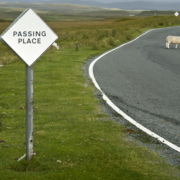Why Cooperation Outperforms Competition in the Long Run
We recently returned from a 9-day trip to Scotland (a magical place if you’ve never been), where we spent time driving through the Highlands—rugged, stunning, and sparsely populated terrain. Once you get outside the main cities, you often find yourself on a single-track roads with camper-vans and oversized rental cars. One ubiquitous feature that stood out immediately were the “passing places”.
If you’re not familiar, these are small pull-off spots placed along the road so drivers can let each other pass in opposite directions. There are no traffic lights, no attendants—just mutual understanding, clear rules, and trust. Most everyone knows what to do, and more importantly, everyone chooses to cooperate, because the system only works if they do.
It struck me: this simple setup is a perfect metaphor for effective cooperation in work and leadership.
Cooperation: The Real Competitive Advantage
In today’s performance-driven world, we often equate success with speed and personal achievement. But the best-performing teams, like those navigating single-lane Highland roads, know that mutual consideration, agreed-upon norms, and shared goals are what keep things flowing and people from getting hurt.
Cooperation vs. competition is a strategic choice. It drives:
-
Better communication
-
Stronger trust and morale
-
Improved long-term results
And just like on those Scottish roads, it requires structure to function.
The Role of Agreed-Upon Rules
What struck me in Scotland was how well things flowed—not because people improvised, but because they understood and respected the same basic rules:
-
Who yields when approaching a passing place
-
How to acknowledge cooperation (a simple wave goes a long way)
-
What to expect from others on the road
Similarly, in high-performing teams, clear agreements serve as the passing places of collaboration. They define how decisions are made, how feedback is given, how conflict is handled, and how accountability is shared.
Rules don’t restrict performance—they enable it. They create confidence, reduce friction, and allow people to act with autonomy and mutual respect. Like passing spaces, rules don’t slow you down—they keep everyone moving.
Leaders Create the Passing Spaces
Leaders are the architects of cooperation. You don’t need to micromanage traffic—you just need to help people build the road and agree on how to drive it:
-
Co-creating norms with your team
-
Reinforcing mutual accountability
-
Modeling trust, humility, and respect
-
Ensuring that collaboration is the default, not the exception
Leadership isn’t just about driving fast—it’s about ensuring everyone has room to move forward.
Shared Roads, Shared Wins
In the Highlands, cooperation isn’t optional—it’s essential. While I know business may not involve sheep crossings and winding roads, the same truth applies: we all move further, faster, and more safely when we build systems that prioritize cooperation over competition.
Passing places don’t just allow progress—they symbolize respect. They remind us that performance isn’t a individual endeavor. It’s a shared road.
Let’s Talk
Want to create more “passing places” in your organization—clear rules, stronger cooperation, and better performance? Let’s design a strategy together.
👉 Connect on LinkedIn 📩 Schedule a consultation 🌐 Learn more

